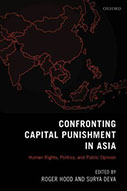Confronting Capital Punishment in Asia: Human Rights, Politics, and Public Opinion

Editors: Roger Hood and Surya Deva
Publisher: New York; Oxford, UK: Oxford University Press, 2014. 336p.
Reviewer: Stephen Noakes | November 2014
What will the future hold for capital punishment in Asia? Are there grounds to be optimistic that recent reforms will evolve toward the elimination of executions in several Asian states, or is the practice likely to be retained, marking the region as exceptional amid a worldwide trend toward abolition? What is the role to be played by Asian publics, politicians or international law in mediating processes of death penalty reform?
In this thoroughly insightful and expertly-crafted volume, editors Roger Hood and Surya Deva reject the premise that the continuing practice of the death penalty in Asia is a product of cultural resistance or uniqueness, pointing out the region’s wide variety of capital punishment policies and practices. They emphasize that while prominent retentionist countries like China, India, Japan, and Singapore are likely to have the greatest long-term impact on prospects for abolition across the region as a whole, a huge assortment of factors, not least the configuration of domestic political regimes, bear on the trajectory of reforms in Asia.
Besides the issue of “Asian culture,” the editors identify a further three themes germane to the question of capital punishment’s future in Asia. These are addressed throughout the book’s four subsections. The first concerns the impact of international norms, a topic of particular importance to the chapters by Michelle Miao, Saul Lehrfreund, Sam Garkawe, and Y. S. R. Murthy. While these contributors do an admirable job of pointing out the ways in which global norms have been influential, the chapters by Børge Bakken and Liu Renwen serve as a sobering reminder that countries like China have a long way to go before international standards and protocols on the death penalty are met. Indeed, the mere existence of international norms and the gradual development of a global abolitionist regime is not in itself a signal of norm compliance at the domestic level. Chapters by Bakken and Mai Sato discuss this issue with specific reference to public opinion in China and Japan, while Franklin Zimring focuses attention on authoritarian governance as significant in the retention of capital punishment in much of Asia.
A final, collectively-addressed theme concerns the challenges to further reform of capital punishment. The contributions of Michael Hor, who discusses the case of Singapore, Liu, Trevaskes, and Bakken, who write on China, David Johnson’s chapter on Japan, and a trio of essays on India by Deva, Batra, and Bindal and Kumar all speak to the political realities of affecting death penalty reforms in practice. Discussion of this last theme is perhaps the greatest strength of the book, since it tempers the humanistic aim of eliminating the death penalty with empirically well-grounded reasons not to be too polyannaish about what is involved in making that vision a reality.
Among the key challenges besetting the quest to abolish capital punishment is the issue of sequencing—a question not taken up directly by the book, but suggested by its examination of the interplay among reform measures, cultural change, and public opinion. To what extent does popular support for discontinuation of the death penalty have to be presented for abolitionist laws to be legitimate? Do changes in public attitudes toward the death penalty necessarily precede abolition, or do cultural shifts occur later as a by-product of bold legal or political reforms? In raising these and other questions, this volume not only adds to our understanding of capital punishment in an area of obvious interest, but opens new and promising directions for further inquiry.
Stephen Noakes is Lecturer in Politics and International Relations and Asian Studies at the University of Auckland.


